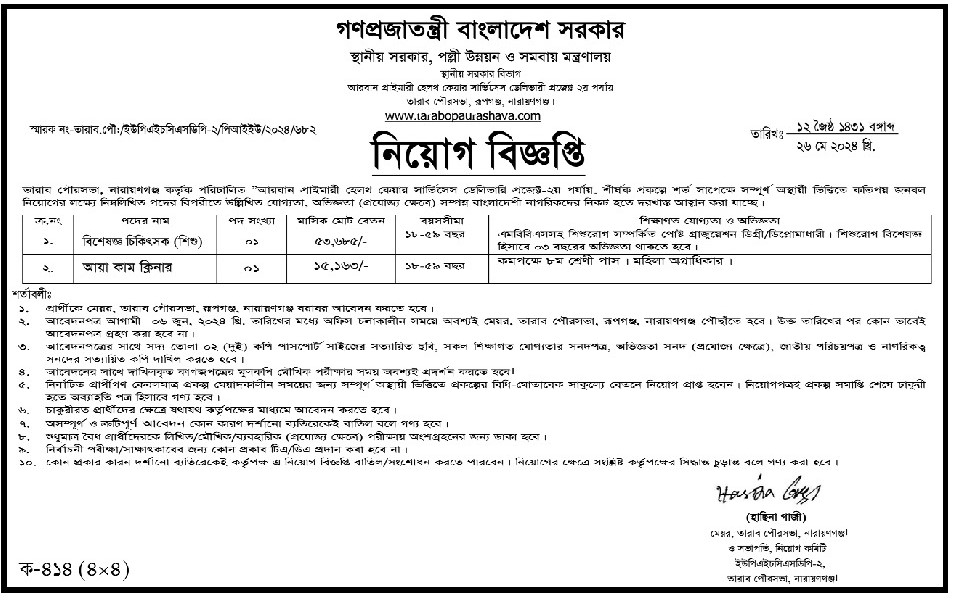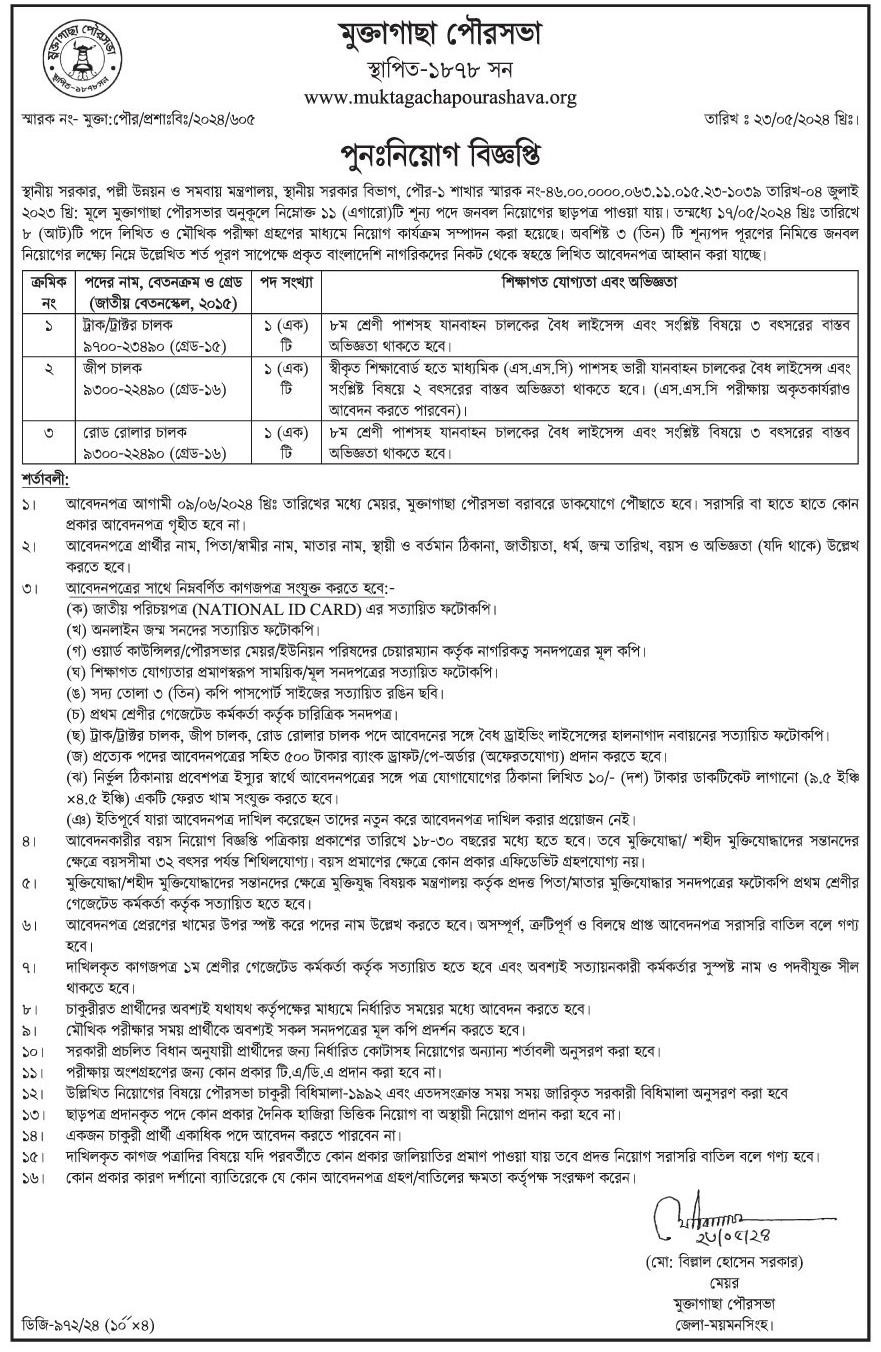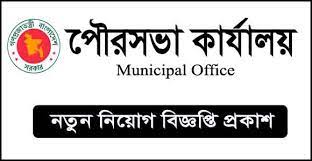Municipal office
পৌরসভা কার্যালয়
Job Category: Govt. Job
Job Source: দৈনিক ইত্তেফাক
Posted On: 27 May 2024
Application Deadline:6 Jun 2024

Web: www.muktagachapourashava.org

Welcome to our website bangladeshtodays.org. This is the best website online. Here you will get daily updates on all types of job news such as: E.g Job Vacancies in Public Sector, Private Sector, Corporate, Banking, NGO Jobs etc. You can select any type of job from the category option in the top menu of the website. You can apply for jobs directly on our website. There is a search option at the top of this website where you can search for jobs according to your requirements. If you have benefited even in the slightest from our website, then you can tell your friends, family and everyone else about this website. I hope you also benefit from this website. You can share this website post on Facebook, Instagram, Twitter or any other online platform if you want. Many people can benefit from your sharing. And if there is anything you want to know or understand, you can contact us by email on the contact page of this website. We will try our best to help you, thank you very much.
The Municipal Office: An In-Depth Exploration
Introduction
The Municipal Office is a fundamental institution in local governance, playing a crucial role in managing urban areas, providing essential services, and ensuring sustainable development. This essay provides a comprehensive overview of the Municipal Office, delving into its historical background, structure, functions, and impact. The discussion will also cover the challenges faced by municipal offices and potential reforms to enhance their effectiveness.
### Historical Background
The concept of municipal governance dates back to ancient civilizations, where local councils and assemblies managed the affairs of cities and towns. In the context of South Asia, including Bangladesh, municipal governance has evolved significantly over the centuries. The modern structure of municipal offices in Bangladesh has its roots in the colonial administration of British India, which established municipal bodies to manage urban areas.
Following independence in 1971, Bangladesh inherited the municipal governance framework from Pakistan. Over the years, the system has been reformed to better address the needs of urban populations and promote local self-governance. Today, municipal offices operate under the legal framework provided by the Local Government (Municipality) Act, 2009, and other related legislation.
### Structure and Governance
The structure of a municipal office typically includes elected representatives and appointed officials who work together to manage the affairs of the municipality. The key components of the municipal governance structure are as follows:
#### Elected Representatives
Municipalities are governed by elected representatives, including the Mayor and Municipal Councilors. These officials are elected by the residents of the municipality through local elections.
– **Mayor**: The Mayor is the chief executive of the municipality, responsible for overseeing its administration and representing the municipality in various forums. The Mayor is elected directly by the voters.
– **Municipal Councilors**: Councilors represent different wards or constituencies within the municipality. They are responsible for addressing the concerns of their constituents and participating in decision-making processes.
#### Municipal Administration
The municipal administration is composed of appointed officials who manage the day-to-day operations of the municipality. Key positions include:
– **Chief Executive Officer (CEO)**: The CEO is the senior-most administrative officer in the municipality, responsible for implementing policies and managing municipal services.
– **Department Heads**: Various departments within the municipal office are headed by officials who oversee specific functions such as public health, engineering, finance, and urban planning.
– **Support Staff**: The municipal office also includes a range of support staff, including clerks, accountants, engineers, and health inspectors, who assist in the execution of municipal functions.
### Core Functions of the Municipal Office
Municipal offices are responsible for a wide range of functions that are essential for the effective management of urban areas. These functions can be broadly categorized into administrative, developmental, regulatory, and service delivery roles.
#### Administrative Functions
Municipal offices are tasked with the general administration of urban areas, including:
– **Implementation of Policies**: Ensuring that national and local government policies are implemented effectively within the municipality.
– **Public Service Delivery**: Managing the delivery of various public services, such as water supply, sanitation, and waste management.
– **Urban Governance**: Overseeing the governance of urban areas, including enforcing municipal bylaws and regulations.
#### Developmental Functions
Municipal offices play a crucial role in the development of urban areas by:
– **Urban Planning**: Formulating and implementing urban development plans, including land use planning, zoning, and infrastructure development.
– **Housing and Infrastructure**: Promoting the development of affordable housing, as well as constructing and maintaining roads, bridges, parks, and public facilities.
– **Economic Development**: Encouraging economic activities within the municipality, including supporting small businesses, promoting tourism, and facilitating trade and commerce.
#### Regulatory Functions
Municipal offices are involved in several regulatory activities, including:
– **Building Regulations**: Enforcing building codes and regulations to ensure safe and sustainable construction practices.
– **Environmental Regulations**: Implementing measures to protect the environment, including controlling pollution, managing waste, and promoting green spaces.
– **Public Health and Safety**: Ensuring public health and safety by regulating food establishments, managing public health programs, and addressing issues such as pest control and sanitation.
#### Service Delivery Functions
One of the primary roles of municipal offices is to provide essential services to urban residents. Key service delivery functions include:
– **Water Supply and Sanitation**: Ensuring access to clean water and adequate sanitation facilities.
– **Waste Management**: Managing the collection, transportation, and disposal of solid waste.
– **Public Health Services**: Providing healthcare services, including immunization programs, maternal and child health services, and disease control initiatives.
– **Public Utilities**: Managing public utilities such as street lighting, drainage systems, and public transportation.
### Impact of the Municipal Office
The municipal office has a significant impact on the quality of life in urban areas and the overall development of cities and towns. Its contributions can be seen in several areas:
#### Urban Governance and Administration
The municipal office plays a central role in the governance and administration of urban areas. By implementing policies, enforcing regulations, and overseeing public services, the municipal office ensures that cities and towns are well-managed and orderly. This contributes to a stable and conducive environment for residents and businesses.
#### Urban Development and Infrastructure
The developmental functions of the municipal office have a direct impact on urban development and infrastructure. By planning and implementing development projects, the municipal office helps create well-planned, livable urban areas. This includes the construction and maintenance of roads, bridges, parks, and public facilities, which enhance the overall quality of life for residents.
#### Economic Growth and Employment
Municipal offices contribute to economic growth and employment by promoting economic activities and supporting businesses within the municipality. By providing infrastructure, services, and a favorable regulatory environment, the municipal office helps attract investment, create jobs, and stimulate economic development.
#### Public Health and Safety
The municipal office plays a crucial role in ensuring public health and safety. Through public health programs, waste management, and regulatory enforcement, the municipal office helps prevent disease, improve sanitation, and ensure the safety of food and water supplies. This has a direct impact on the health and well-being of urban residents.
#### Environmental Sustainability
Municipal offices are responsible for promoting environmental sustainability in urban areas. By implementing environmental regulations, managing green spaces, and promoting sustainable practices, the municipal office helps protect the environment and ensure the long-term sustainability of urban areas.
### Challenges Faced by Municipal Offices
Despite their important role, municipal offices face several challenges in fulfilling their mandate. These challenges include:
#### Resource Constraints
Limited financial and human resources can hinder the ability of municipal offices to effectively carry out their functions. Insufficient funding and staffing can impact the implementation of development projects, public service delivery, and regulatory activities.
#### Rapid Urbanization
Rapid urbanization poses significant challenges for municipal offices. The increasing population in urban areas leads to greater demand for services, infrastructure, and housing. Managing this growth in a sustainable manner requires effective planning and resource allocation.
#### Informal Settlements
The proliferation of informal settlements or slums in urban areas presents a challenge for municipal offices. These settlements often lack basic services and infrastructure, and addressing their needs requires targeted interventions and inclusive urban planning.
#### Bureaucratic Red Tape
Bureaucratic red tape and complex administrative procedures can slow down decision-making and implementation processes. This can lead to delays in service delivery and project execution, affecting the overall efficiency of the municipal office.
#### Public Expectations
Municipal offices often face high public expectations regarding service delivery and governance. Meeting these expectations can be challenging, especially in the face of resource constraints and bureaucratic hurdles. Ensuring transparency, accountability, and responsiveness is crucial to maintaining public trust and confidence.
### Future Directions and Reforms
To address these challenges and enhance their effectiveness, municipal offices can consider several reforms and future directions:
#### Strengthening Resource Allocation
Ensuring adequate financial and human resources is essential for the effective functioning of municipal offices. This includes increased budgetary allocations, capacity-building programs for staff, and leveraging technology to improve efficiency.
#### Promoting Sustainable Urban Planning
Implementing sustainable urban planning practices is crucial for managing rapid urbanization and ensuring the long-term development of cities. This includes integrated land use planning, promoting public transportation, and encouraging green building practices.
#### Enhancing Service Delivery
Improving the delivery of essential services is a key priority for municipal offices. This includes upgrading infrastructure, expanding access to basic services, and adopting innovative solutions such as smart city technologies to enhance service delivery.
#### Simplifying Administrative Procedures
Streamlining administrative procedures and reducing bureaucratic red tape can enhance the efficiency of municipal offices. This includes adopting e-governance initiatives, simplifying licensing and permitting processes, and promoting a culture of accountability and transparency.
#### Promoting Public Participation
Engaging the public in decision-making processes can help municipal offices better understand and address their needs and expectations. This includes regular public consultations, feedback mechanisms, and participatory planning approaches.
#### Addressing Informal Settlements
Targeted interventions are needed to address the challenges of informal settlements. This includes regularizing land tenure, providing basic services, and implementing slum upgrading programs to improve living conditions.
### Conclusion
The municipal office is a vital institution in the governance and development of urban areas. Through its administrative, developmental, regulatory, and service delivery functions, the municipal office plays a crucial role in managing cities and towns, providing essential services, and promoting sustainable development. Despite facing challenges such as resource constraints, rapid urbanization, and bureaucratic hurdles, municipal offices continue to contribute significantly to the well-being of urban residents and the overall development of cities.
By adopting reforms and embracing future directions, municipal offices can enhance their effectiveness, improve service delivery, and promote sustainable and inclusive urban development. Strengthening resource allocation, promoting sustainable urban planning, enhancing service delivery, simplifying administrative procedures, and engaging the public are key steps towards achieving these goals. As Bangladesh continues to urbanize, the role of the municipal office will remain central to shaping the future of its cities and towns, ensuring they are well-managed, livable, and resilient.

